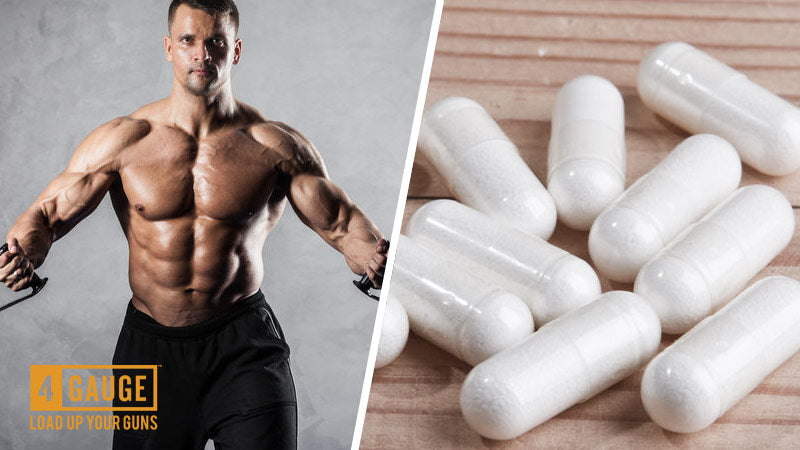
A key benefit of taking a pre-workout supplement is to experience bigger muscle pumps whilst you are training. For this reason, many of the best products on the market contain ingredients to deliver this.
Basically, ingredients that raise nitric oxide levels are effective in enhancing muscle pumps. But there any many nutrients that claim to offer benefits, but haven’t shown to deliver them in any studies.
Arginine is one of these ingredients. It plays an important role in your body, to raise nitric oxide production. However, Arginine doesn’t have the same effect when consumed through oral supplementation.
In this article, you’ll find out:
- What Is L-Arginine?
- Is It Effective?
- What are the Side Effects
- Other Ingredients For Muscle Pumps
- Conclusion
What Is L-Arginine?
Arginine is an amino acid responsible for regulating your nitric oxide levels.
Basically, if you produce more arginine, then your blood flow increases – which results in bigger and better muscle pumps in the gym.
What is an amino acid?
Amino acids are what make up protein. Basically, when protein is broken down in your body, it’s separated into specific amino acids.
There are 20-22 standard amino acids, with 10 of them being considered essential – your body needs them to function normally.
An example of essential amino acids are the 3 BCAAs (Branched Chain Amino Acids); leucine, isoleucine, and valine. Simply put, these are important for muscle protein synthesis (muscle growth).
The 10-12 amino acids that aren’t required for normal bodily function can still impact your workout and bodily functions – you just don’t need them to function normally.
Examples of these would be theanine and arginine.
Arginine can be found naturally in such foods as:
Meats
- Turkey (16g per cup)
- Pork Loin (14g per cup)
- Chicken (9g per cup)
Legumes
- Pumpkin Seeds (7g per cup)
- Soybeans (4.6g per cup)
- Peanuts (4.6g per cup)
- Spirulina (4.6g per cup)
- Chickpeas (1.3g per cup)
- Lentils (1.3g per cup)
Dairy
- Milk (o.2g per cup)
- Cheddar Cheese (0.25g per cup)
As you can see, it’s very possible to consume enough of this amino acid from a well-planned diet – meaning it’s not really needed in a supplement.
Read on, to find out if arginine’s effective in a pre workout.
Is L-Arginine Effective?
We’ve mentioned that arginine is important when aiming to improve blood flow, and therefore muscle pumps in the gym. However, there’s a problem with this nutrient.
Simply put, this amino acid has a poor absorption rate – meaning it’s mostly ineffective when orally supplemented or digested in foods.
You can increase the absorption rate of arginine slightly, by consuming it with glutamine (another non essential amino acid) – but this is generally still not too effective. And over complicates the process to ensure a massive muscle pump when you train.
The Science Behind It
Scientific studies are important when checking how effective an ingredient is – these prove whether a nutrient works, or is ineffective under strict conditions.
Take a look at what we found:
Blood Flow
A clinical study by Fahs CA [1] aimed to determine whether Arginine improved blood flow after being orally supplemented. To do this, they measured the effects the nutrient had on 18 participants during resistance exercise.
The result:
- Arginine orally supplemented didn’t affect blood flow – Fahs CA concluded that this amino acid didn’t have any effect on blood flow.
Nitric Oxide Levels
Liu TH et al [2] examined the effects of Arginine on nitric oxide levels using 10 elite athletes. These participants were asked to perform intense exercise after being given dosages of 6g for 3 days.
The result:
- Arginine supplementation didn’t affect nitric oxide production – This study showed that this nutrient orally supplemented was ineffective in raising nitric oxide production.
Any Side Effects?
The good news is that this nutrient hasn’t shown, or been reported, to cause many side effects.
However, in rare circumstances, supplementing it as part of a gym product can cause such side effects as; diarrhea, abdominal pain, and bloating.
Best Ingredient For Muscle Pumps
When it comes to boosting your nitric oxide levels, there are better options than arginine in a pre workout – the best being citrulline malate.
Why Citrulline Malate?
This nutrient is proven to improve your nitric oxide levels, by converting into arginine in your kidneys after oral supplementation. As citrulline malate has a great absorption rate, most of it is utilized by your body.
This removes the problem caused by arginine (it’s poor absorption rate) – meaning citrulline malate delivers the same benefits more efficiently.
For this reason, 4 Gauge contains an optimal 6,000 mg of this nutrient, ensuring you experience skin-splitting muscle pumps throughout your training session.
To learn more, check out our full article about citrulline malate here.
Conclusion
L-Arginine plays a key role in raising your nitric oxide levels – it’s proven that having higher amounts of this amino acid in your system, results in increased blood flow and muscle pumps.
But here’s the problem – this nutrient has a poor absorption rate, meaning your body doesn’t make full use of the nutrient when orally supplemented or digested in foods.
For this reason, your best alternative is citrulline malate – this converts into l-arginine once in your kidneys, which resolves the problem of arginine’s poor absorption rate.
4 Gauge
4 Gauge has been formulated after extensive research, and contains the optimal 6,000mg of citrulline malate you need – to experience skin-splitting muscle pumps in the gym.
Our hard-hitting pre workout improves your:
- Focus – Stay concentrated on your goals and form stronger mind-muscle-connection, to make the most of your workout.
- Energy – Never feel tired in the gym again, with optimal energy levels throughout your gym session.
- Strength – Smash your PB’s by squatting or bench pressing more weight than before.
- Endurance – Train longer, for harder with more explosive power and endurance.
- Muscle Pumps – Feel your muscles increasing in size
– Learn More About 4 Gauge’s Ingredients Here –
References
[1] Fahs CA. Hemodynamic and vascular response to resistance exercise with L-arginine. Med Sci Sports Exerc. 2009 Apr; 41(4): 773-9.
[2] Liu TH. No effect of short-term L-arginine supplementation on nitric oxide production, metabolism and performance in intermittent exercise in athletes. J Nutr Biochem. 2009 Jun;20(6):462-8.


